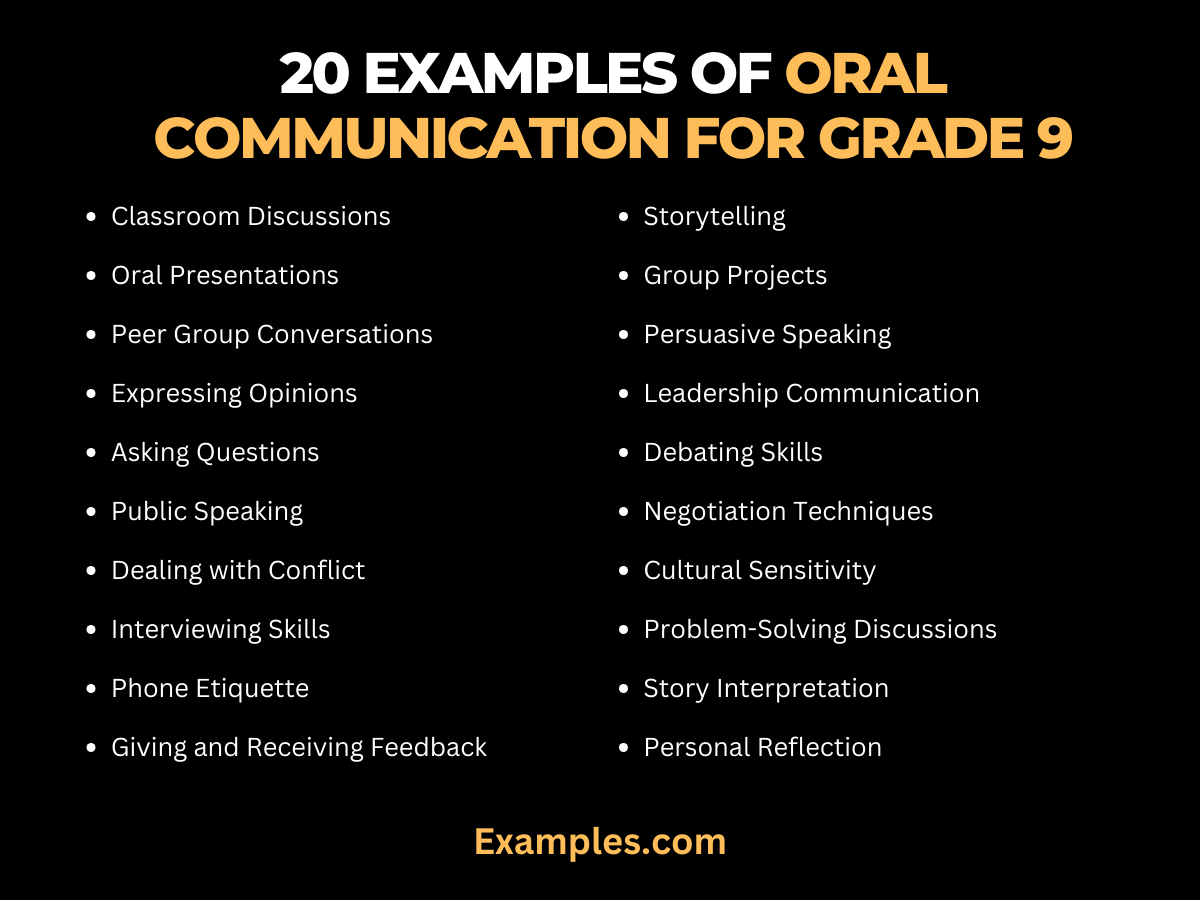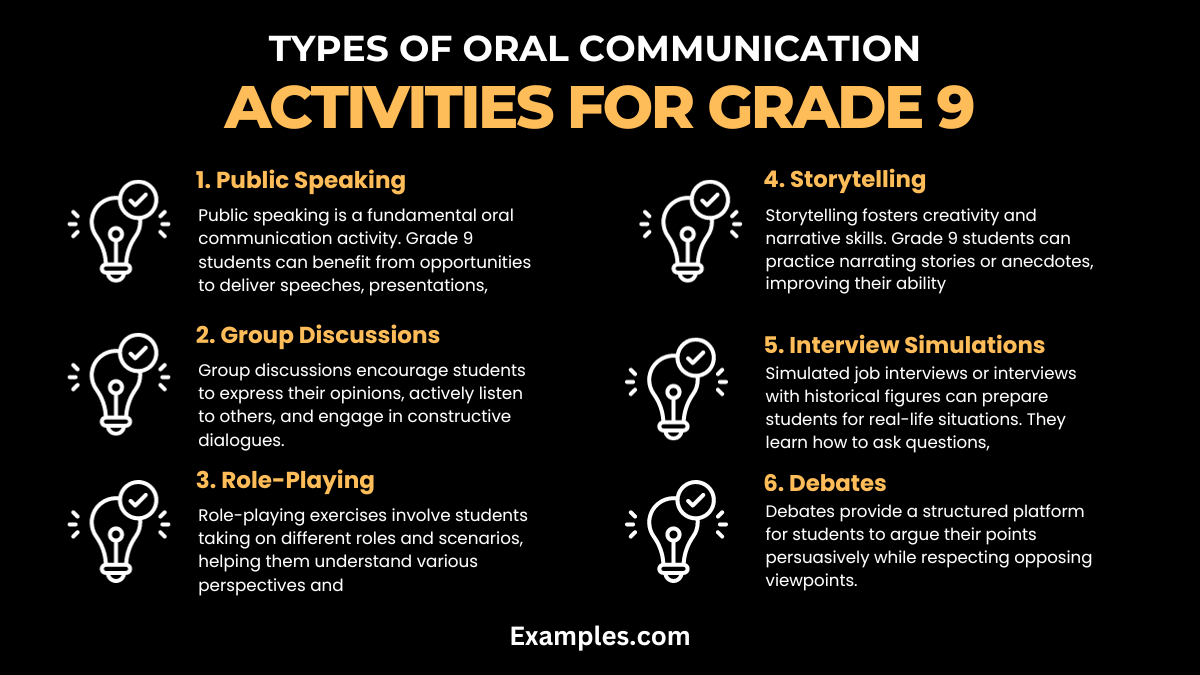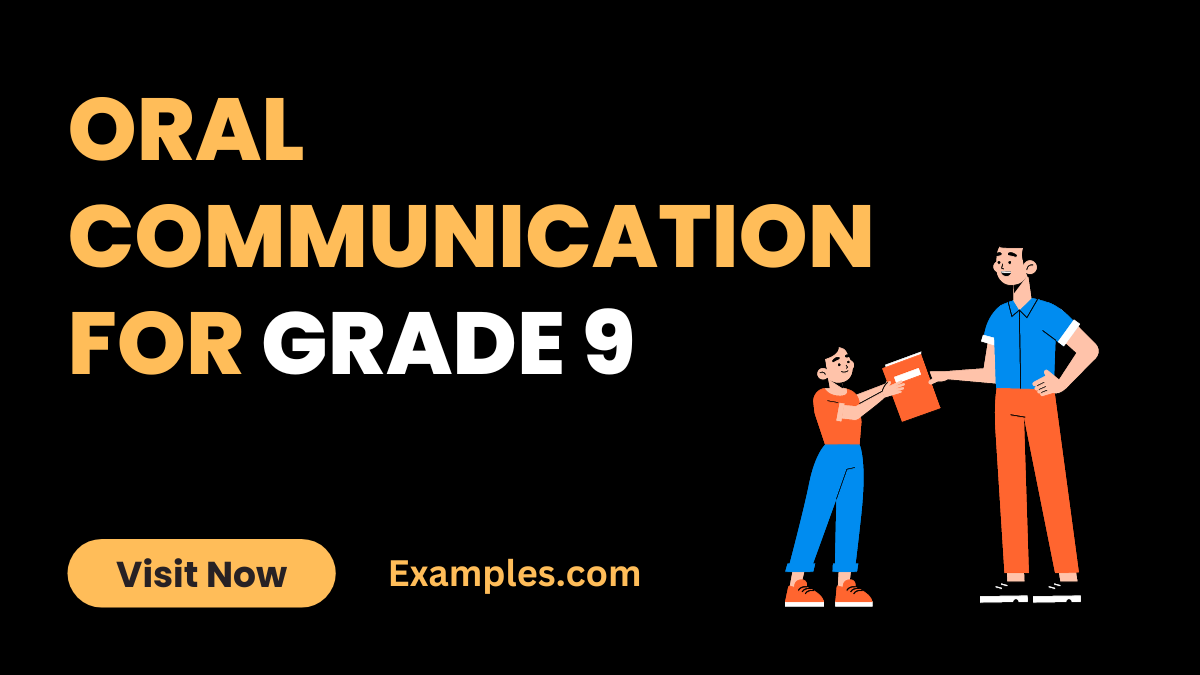19+ Oral Communication for Grade 9 Examples
Unlock the world of effective Grade 9 Oral Communication with our comprehensive guide! 🌟 In this complete resource, we’ll explore the ins and outs of oral communication for ninth graders, providing you with practical skills and sentence examples that will empower you to communicate confidently and articulately. Whether you’re looking to enhance your public speaking abilities, improve your interpersonal communication, or simply boost your self-assurance, our guide has you covered. Get ready for an exciting journey filled with Communication Examples that will help you excel in grade 9 and beyond.
20 Examples of Oral Communication for Grade 9
Looking for inspiration to enhance your Grade 9 oral communication skills? You’ve come to the right place! In this comprehensive list, we present 20 distinct and engaging oral communication examples, each accompanied by a brief explanation of how to effectively communicate in that scenario. From active listening to persuasive speaking, these examples cover a wide range of communication scenarios that will help you excel in grade 9 and beyond.

- Classroom Discussions: Engage actively in classroom discussions by researching the topic beforehand, asking clarifying questions, and respectfully challenging ideas to promote deeper understanding.
- Oral Presentations: Deliver impactful presentations by incorporating visuals, such as slides or props, to reinforce key points and maintain the audience’s attention.
- Peer Group Conversations: Build strong peer relationships by practicing active listening, which involves maintaining eye contact, nodding, and asking follow-up questions to show genuine interest.
- Expressing Opinions: Practice the “I” statements technique when expressing opinions. For example, say, “I believe that…” or “In my view…” to convey your perspective without sounding confrontational.
- Asking Questions: Enhance your critical thinking skills by asking open-ended questions that encourage in-depth discussions and exploration of ideas.
- Public Speaking: Conquer stage fright by rehearsing your speech multiple times, focusing on your breathing, and using gestures to emphasize key points.
- Dealing with Conflict: When conflicts arise, practice active listening to understand the other person’s viewpoint before expressing your own. Use “I” statements to express your feelings and needs.
- Interviewing Skills: Prepare for job interviews by researching the company and role, rehearsing answers to common questions, and using the STAR method (Situation, Task, Action, Result) to respond to behavioral questions.
- Phone Etiquette: Maintain a pleasant and professional tone during phone conversations by speaking clearly, addressing the caller by name, and avoiding distractions.
- Giving and Receiving Feedback: When giving feedback, start with positive comments, be specific about areas for improvement, and suggest actionable solutions. When receiving feedback, show gratitude and ask for clarification if needed.
- Storytelling: Craft engaging narratives by including vivid details, relatable characters, and a clear plot structure (beginning, middle, and end).
- Group Projects: Collaborate effectively with peers by setting clear goals, dividing tasks based on strengths, and regularly communicating progress and challenges.
- Persuasive Speaking: Use rhetorical devices, such as anecdotes, statistics, and emotional appeals, to persuade your audience effectively.
- Leadership Communication: Lead by example and communicate your vision clearly to inspire and motivate others to achieve common goals.
- Debating Skills: Enhance your debating skills by researching both sides of the argument thoroughly, anticipating counterarguments, and using logical reasoning to support your position.
- Negotiation Techniques: In negotiations, create win-win solutions by identifying shared interests and being flexible in finding compromises.
- Cultural Sensitivity: Show cultural sensitivity by actively seeking to understand and appreciate different cultural norms and customs.
- Problem-Solving Discussions: Engage in structured problem-solving discussions by identifying the problem, brainstorming solutions, evaluating options, and implementing the best course of action.
- Story Interpretation: Improve analytical skills by exploring the symbolism, themes, and character development in literary works, contributing to meaningful class discussions.
- Personal Reflection: Enhance self-awareness by regularly engaging in self-reflection and discussing your thoughts, feelings, and personal growth with trusted peers or mentors.
Methods of Oral Communication for Grade 9
Unlock a world of effective oral communication methods tailored for Grade 9 students. This comprehensive guide explores a multitude of techniques to help you communicate confidently and persuasively. From mastering formal presentations to engaging in dynamic discussions, these methods provide the tools you need to succeed in various communication contexts.
- Oral Debates: Sharpen your persuasive skills by engaging in structured debates, where you’ll learn to articulate your viewpoint effectively while respecting opposing arguments.
- Role-Playing: Cultivate empathy and adaptability through role-playing scenarios that allow you to step into different roles and explore diverse perspectives.
- Group Discussions: Collaborate and exchange ideas with peers in group discussions that encourage active participation and the exchange of diverse viewpoints.
- Storytelling Sessions: Develop your narrative prowess by sharing captivating stories, whether personal experiences or fictional tales, employing storytelling techniques to captivate your audience.
- Mock Interviews: Gain a competitive edge in job interviews by participating in mock interview sessions, perfecting your responses and interview etiquette.
- Public Speaking Workshops: Join workshops dedicated to enhancing public speaking skills, where you’ll receive valuable feedback and practical strategies for improvement.
- Listening Circles: Elevate your listening skills in listening circles, a setting where participants take turns sharing and attentively listening, fostering deep understanding.
- Extempore Speaking: Hone your ability to speak on the spot with extempore speaking exercises, allowing you to think quickly and articulate ideas coherently.
- Podcast Creation: Dive into the world of podcasting, where you’ll refine your speaking and content creation skills while delivering engaging audio content.
- Debate Clubs: Join debate clubs and engage in formal debates on a wide range of topics, refining your argumentative and persuasive abilities.
Oral Communication Learning Activity – Grade 9
Explore captivating learning activities designed to enhance Grade 9 oral communication skills. These engaging experiences not only promote learning but also make the journey enjoyable, making it easier to build strong communication abilities.
- Story Chain: Embark on a collaborative storytelling adventure, where each participant contributes a sentence to create an evolving narrative.
- Oral History Interviews: Connect with family members or elders through oral history interviews, an opportunity to practice active listening and learn from their life experiences.
- Role-Playing Scenarios: Dive into real-life scenarios through role-playing, such as job interviews or conflict resolution, allowing you to hone practical communication skills.
- Debate Tournaments: Organize friendly debate tournaments within your class, providing a platform for critical thinking and persuasive speaking.
- Public Speaking Contests: Participate in public speaking contests to challenge yourself and receive constructive feedback, accelerating your growth as a communicator.
- Listening Quizzes: Test and enhance your listening skills with engaging quizzes based on audio clips or speeches, strengthening your ability to comprehend spoken content.
- Storytelling Competitions: Compete in storytelling competitions, where you’ll captivate audiences with imaginative narratives and refine your storytelling prowess.
- Oral History Projects: Undertake in-depth research and presentation of oral history projects, unveiling untold stories from your community or region.
- Interactive Drama: Collaborate with peers to create and perform short dramas that demand effective communication and teamwork.
- TED-Style Talks: Prepare and deliver TED-style talks on topics close to your heart, honing your skills in delivering clear, engaging, and impactful presentations.
What are the 6 types of oral communication activities for Grade 9?
Grade 9 is a crucial year for students to develop effective oral communication skills. These skills not only help in academics but also play a significant role in personal and professional growth. Here, we will explore six types of oral communication activities that are particularly beneficial for Grade 9 students in their journey to becoming effective communicators.

- Public Speaking
Public speaking is a fundamental oral communication activity. Grade 9 students can benefit from opportunities to deliver speeches, presentations, or debates. It enhances their ability to articulate ideas clearly and confidently in front of an audience. - Group Discussions
Group discussions encourage students to express their opinions, actively listen to others, and engage in constructive dialogues. It promotes critical thinking and teamwork, valuable skills for communication. - Role-Playing
Role-playing exercises involve students taking on different roles and scenarios, helping them understand various perspectives and empathize with others. This activity enhances both verbal and non-verbal communication skills. - Storytelling
Storytelling fosters creativity and narrative skills. Grade 9 students can practice narrating stories or anecdotes, improving their ability to engage and captivate listeners. - Interview Simulations
Simulated job interviews or interviews with historical figures can prepare students for real-life situations. They learn how to ask questions, respond effectively, and make a positive impression. - Debates
Debates provide a structured platform for students to argue their points persuasively while respecting opposing viewpoints. This activity hones research skills and the ability to present a compelling argument.
How Can I Improve Oral Communication Skills in Grade 9?
Oral communication skills are invaluable for academic success and personal growth. Grade 9 is an ideal time to work on these skills and develop them further. Here are some practical steps to improve your oral communication skills during this important year.
- Practice Regularly
Consistent practice is key to improving oral communication. Engage in conversations, debates, or discussions with peers, teachers, and family members. - Active Listening
Effective communication begins with listening. Pay attention to what others are saying, ask clarifying questions, and show that you value their input. - Join Clubs and Activities
Participate in clubs or activities that involve public speaking, drama, or debate. These extracurriculars provide opportunities to refine your communication skills in a supportive environment. - Record Yourself
Recording your speeches or presentations allows you to review and identify areas for improvement, such as tone, clarity, or body language. - Seek Feedback
Don’t hesitate to ask for feedback from teachers, peers, or mentors. Constructive criticism helps you pinpoint areas where you can grow. - Read Widely
Expanding your vocabulary and exposure to different styles of communication through reading can significantly enhance your oral communication skills. - Manage Nervousness
It’s normal to feel nervous before speaking in public. Practice relaxation techniques to manage anxiety, such as deep breathing and visualization. - Set Goals
Define specific goals for improving your oral communication skills. Whether it’s reducing filler words or improving enunciation, having clear objectives will keep you motivated. - Observe Great Speakers
Watch and learn from accomplished public speakers, such as TED Talk presenters or renowned orators, to pick up techniques and inspiration. - Embrace Opportunities
Don’t shy away from opportunities to speak in front of an audience, as each experience contributes to your growth.
In conclusion, the article “Oral Communication for Grade 9” on Examples.com provides a comprehensive overview of oral communication skills essential for ninth graders. These skills are not only pivotal for academic success but also play a critical role in personal and professional development. The guide offers various techniques and activities that can significantly improve students’ communication abilities, such as understanding the elements of effective speaking, practicing active listening, and engaging in group discussions.
To further enhance their oral communication skills, students can explore additional resources. The Department of Education in the Philippines offers an extensive resource titled “Oral Communication in Context.” This educational material is specifically designed to aid in the development of communication skills among students, providing a structured and detailed approach to learning. It can be accessed at the following link: Department of Education, Philippines – Oral Communication in Context.
Moreover, Harvard University’s Professional Development blog provides “10 Tips for Improving Your Public Speaking Skills.” This resource is invaluable for students looking to refine their public speaking and presentation skills. It offers practical advice on various aspects of public speaking, such as dealing with nervousness, engaging the audience, and effectively organizing a speech. This resource can be found at Harvard University – Tips for Public Speaking.



